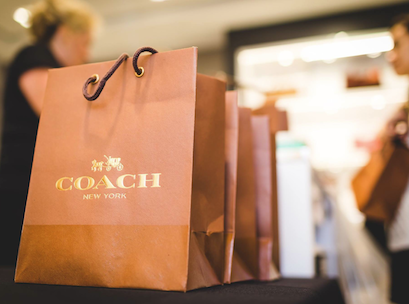 Luxury fashion giant, Tapestry, has posted solid third quarter growth, boosted by strong sales from its Coach brand.
Luxury fashion giant, Tapestry, has posted solid third quarter growth, boosted by strong sales from its Coach brand.
Tapestry posted a 33 per cent increase in net sales for the quarter ending March 31 to $1.32 billion compared to the previous corresponding period, and relatively strong results from Coach where overall sales rose six per cent.
Same-store sales for its Kate Spade brand, however, plunged nine per cent in the quarter because of a decline in online revenue. The company also posted its Stuart Weitzman’s profit margin was hurt by production delays and weaker sales of older shoes.
The company’s operating income for the quarter was $159 million on a reported basis, while operating margin plunged 12.0 per cent compared to the 15.2 per cent in the prior year. On a non-GAAP basis, operating income was $184 million, an increase of 14 per cent from the previous year, while operating margin was 13.9 per cent from the 16.3 per cent in last year’s third quarter.
Victor Luis, Tapestry chief executive, said their solid third quarter performance was consistent with their expectations, as they achieved double-digit increases in sales and earnings per share.
“Results were driven by continued growth at Coach, where comparable store sales rose, led by outperformance in North America, and reflected our strong offering, including the successful global relaunch of Signature in retail,” Luis said. “We leveraged these sales gains, tightly controlling costs, and delivered operating income growth ahead of the top line increase.”
During the quarter, the company has completed the buybacks of the Coach business in Australia and New Zealand as well as the Stuart Weitzman business in Northern China, while also taking operational control of the Kate Spade joint ventures for Mainland China, Hong Kong, Macau and Taiwan.
Tapestry also gave an updated guidance that offered reason for optimism about Kate Spade. It now expects that acquisition to create $45 million in synergies, up from the $30 to $35 million it outlined in previous guidance. The company has also stated it now also expects Kate Spade to contribute $145 million in operating income for the year, higher than the $130 to $140 million in earlier guidance.
According to Neil Saunders, managing director of GlobalData Retail, the bounce in Tapestry’s results that comes from Coach where sales growth accelerated to 5.9 per cent on a total basis and three per cent on a global comparable basis is encouraging,
“In our view, this indicates that the Coach brand continues to gain ground across the demographic spectrum,” Saunders said. “From our own brand tracking, we are particularly encouraged to see growing interest among younger consumers – something that is helping to fuel strong numbers in the e-commerce division.”
Saunders said on the product front, they believe that the current range is compelling.
“The recent relaunch of the Signature collection – which features an interlocking ‘C’ motif – has been particularly successful, with popular products like the Charlie Carryall tote doing well. In our opinion, the popularity of the iconic ‘C’ signature design shows how much the brand image of Coach has strengthened over the past year or so,” he said.
He added that looking ahead, they think that the economic environment will continue to be supportive into the next quarter, as residual tax refunds and bonuses come through.
“However, thereafter these benefits will wane, putting some downward pressure on growth,” he said. “However, as the underlying fundamentals of Coach remain strong, growth will remain good – with a possible boost in fall thanks to an expanded collaboration with Selena Gomez.”
Overall, he said, Tapestry is currently a mixed bag of businesses.
“However, all are headed in the right direction and this gives us confidence the group will fulfil its ambition of becoming a strong luxury lifestyle company.”
Access exclusive analysis, locked news and reports with Inside Retail Weekly. Subscribe today and get our premium print publication delivered to your door every week.






